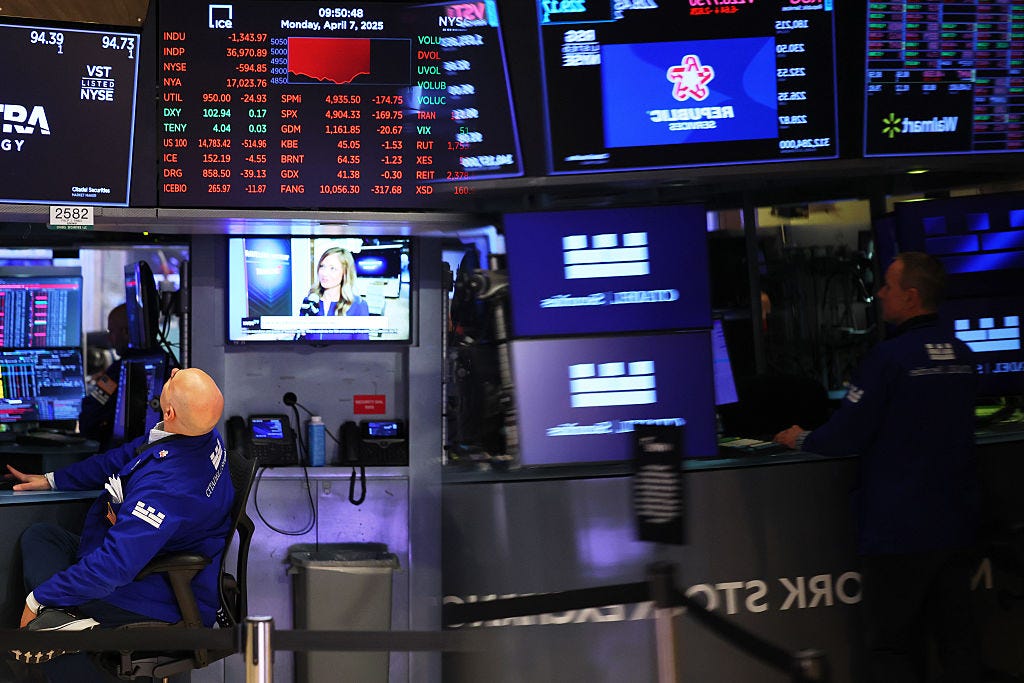Tyler Cowen: A Contagion of Uncertainty
Tyler Cowen: A Contagion of Uncertainty Even if the White House ultimately lands on a better policy, this volatility may plunge us into a recession.
Traders
work on the floor of the New York Stock Exchange on April 7, 2025 in
New York City. (Michael M. Santiago via Getty Images)
The latest rumor, when I started drafting this column, was that President Trump will suspend the tariffs for a 90-day period, with the exception of those on China. Markets started going back up again. But “the very latest information” doesn’t stay current for long these days. The new report—but don’t count on it—is that the 90-day pause is not real after all. That revision came out before this draft was finished. And markets again whipsawed. The Trump administration has created a new monster—one of unpredictability and erratic behavior. We simply cannot predict with any degree of accuracy what will happen next. By the time you are reading this article, there will probably be some newer report about the tariffs or threat of tariffs, and then another report after that. Even if the White House winds up instituting a pause on the proposed tariffs—or ultimately adopts much better economic policies—this seesawing may plunge the American and perhaps also the global economy into recession. Before Trump’s “Liberation Day” announcement of April 2, markets did not know what exactly to expect. It is not clear that many people inside the Trump administration knew what to expect. Indeed, maybe Trump himself, up until the very end, was unsure about what policy he would announce. Here we are, a week later, and that uncertainty has been heightened further. It is not merely that the policies keep on changing. We are seeing that the policies didn’t have much of a rational basis to begin with. Exactly how were all those threatened tariff rates calculated to begin with? A debate is raging across the internet and social media, but it seems they did not have much of a logical basis. We even were ready to put a tariff rate of 10 percent on the Heard Island and McDonald Islands (where?), which are inhabited mostly by penguins. Not a single step of this process has inspired confidence. A variety of people are trying to defend the Trump plans on social media, but with markets plummeting they have not been convincing. We saw a three-day market loss of about 13 percent, and no coherent government response. Who in the Trump administration has presented any account of its policies to the public with any degree of knowledge, competence, or credible reassurance? What I have seen is Secretary of Commerce Howard Lutnick speaking about the new jobs Americans might have assembling iPhones, something which currently would most likely be done in a Chinese factory. Who is supposed to be thrilled by that vision of the American future? Or should we be reassured by the possibility that Lutnick did not mean that remark literally, but instead was speaking out of mere carelessness? Keep in mind that businesses crave certainty. If they are investing in a new factory, they want that venue to be in place, and profitable, for at least five to 10 years. If they hire a new worker, they usually want that relationship to endure for at least several years, and maybe for much longer. If they enter a new product line, they want that to be a real commitment, perhaps for decades. All that requires some ability to calculate what business conditions will be like in the future. In a matter of days, that ability has been taken from them. As the degree of uncertainty rises, businesses simply will wait. They will invest much less, they will not seek out new markets, and they will be less inclined to hire more workers. They will let contracts lapse rather than extending them—why place an order for a new batch of motors if you are not sure your business will be growing? In today’s world, with super-complex supply chains stretching across many nations, more business plans are being disrupted than we might have expected in earlier times. This uncertainty feeds upon itself. Everyone knows that businesses do not like radical uncertainty, but they are never sure by how much. So the response to the Trumpian uncertainty becomes a new source of uncertainty all its own. This entire process feeds upon itself. The end result may well be a recession. The prediction market Kalshi estimates the chance of recession has increased to more than 60 percent. Not only is that outcome terrible for Americans and, indeed, most of the world, but if you are a die-hard Republican, it is awful for the longer-run fortunes of the GOP. Everyone knows that Trump owns whatever comes out of this. How long will it take before Republicans can once again ask voters to trust them with the economy? It is not only that Trump is erratic on future tariff rates, but uncertainty has risen about many other variables as well. Might Trump try to take away the independence of the Fed? Will budget policy be responsible, or will our Republican Congress help Trump run up the national deficit and debt higher? Are any of the proposed regulatory reforms going to work out, and is Trump going to stick with his (so far) pro-AI posture? Or how about foreign policy, where America faces raging crises with Iran, Yemen, China/Taiwan, and Russia/Ukraine? Stability and competence of decision-making in all of these areas now is thrown into further doubt. Can anyone really claim that the spectacle since April 2 has put America in a better position to address these conflicts? Those penguins on Heard Island probably are going to be fine. It is the rest of us I am worried about. |






Post a Comment